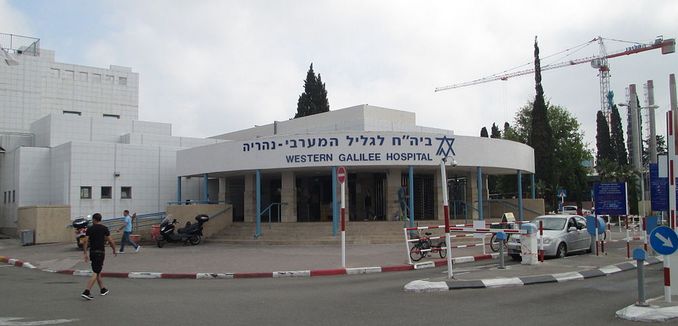No one seems willing to help Syrians injured in that country’s civil war except for “God and Israel,” is a common sentiment expressed by the wounded Syrians who have been treated in Nahariya’s Western Galilee Hospital, Haaretz reported Saturday.
The Western Galilee Hospital, which is located in Nahariya on Israel’s northern Mediterranean coast, is situated just a few kilometers away from the Lebanese border, and has become a sanctuary for victims of Syria’s brutal civil war.
The medical center with 722 beds opened its doors in 1956 and from 2013, the year Israel first admitted patients from the Syrian battlefield, has treated approximately 1,600 men, women and children.
According to Israeli officials, the country has so far quietly taken in more than 3,000 Syrians. The medical care provided is free of charge and hospitals do not discriminate on grounds of politics and religion when it comes to admittance. The patients receive treatment under strict anonymity out of fear that they and their families could be targeted in Syria if their stay in Israel became public.
Although the war in Syria has claimed many more victims than Israel can treat, both doctors and patients agree that Israel’s willingness to take in wounded from an enemy country has changed perceptions across the border.
“If I treat one man, 50, 1,500, and they go back to Syria, their families will be grateful. At some stage the child or grandchild will ask about their scar, and they’ll explain that the Zionist enemy treated them and saved their lives”, said Dr. Eyal Sela from Nahariya hospital.
In their long list of enemies – Assad, Islamic State, Russia, Iran, Hezbollah and Al Qaeda – his patients no longer include Israel. A common sentiment expressed by those recovering is “the whole world is looking at Syria and doing nothing. There’s nobody to help us but God and Israel. Inshallah, may all the nations of the world intervene and end this war.”
In January, Fadi, a man recovering in Ziv Medical Center in Safed told The Jerusalem Post that Syrians no longer believe the indoctrination from the Assad regime “that the Israeli people is our enemy,” rather “we want peace with Israel and all the peoples around the world.”
Aside from the humanitarian aspect to saving those wounded in the war, cooperation with rebel groups near Israel’s border also affords Israel a measure of protection, as Jonathan Spyer described in How Israel Navigated Through the Hurricane of the Syrian Civil War, which was published in the March 2016 issue of The Tower Magazine.
It is an open secret in Israel that the country maintains relations with Sunni rebel elements in the area adjoining the border in Quneitra Province. The reason is to ensure that they remain the dominant force on the border, rather than elements aligned with the Assad regime, Iran, or the Lebanese terror group Hezbollah. The Israeli policy of providing medical aid to Syrian civilians and wounded rebel fighters from this area is clearly an aspect of this policy (in addition to purely humanitarian considerations). The precise nature of the assistance afforded the rebels is not known. No evidence, however, has emerged of direct military aid. Given the great efforts to which Israel goes in order to ensure a clear intelligence “picture” of events in southwest Syria, it may be assumed that intelligence sharing probably forms part of the relationship.
The rebels located close to the border are a mixed bunch. In the southern corner is Liwa Shuhada al-Yarmouk, a rebel group of long standing which is now clearly affiliated with the Islamic State. Israel has closely followed the movement of this organization in the direction of IS and is concerned about it. The relations between Israel and the group are hostile, though they have not yet resulted in open violence. There are Israeli concerns that a second rebel group in the area, the Harakat al-Muthanna al-Islamiya organization, may also be moving closer to the Islamic State.
According to informed sources, Israeli contacts with rebel elements close to the border are not limited to the Western-supported rebel coalition called the Southern Front. They also include elements sympathetic to and affiliated with Sunni Islamist groups. Israeli sources note that the rebellion is a fragmented, localized phenomenon. As such, it has been possible to foster small-scale cooperation independent of the broader ideological sympathies of these groups. As a result, one former senior security official described the area east of Quneitra Crossing as a “virtual security zone” for Israel.
[Photo: Dr. Avishai Teicher / WikiCommons ]




